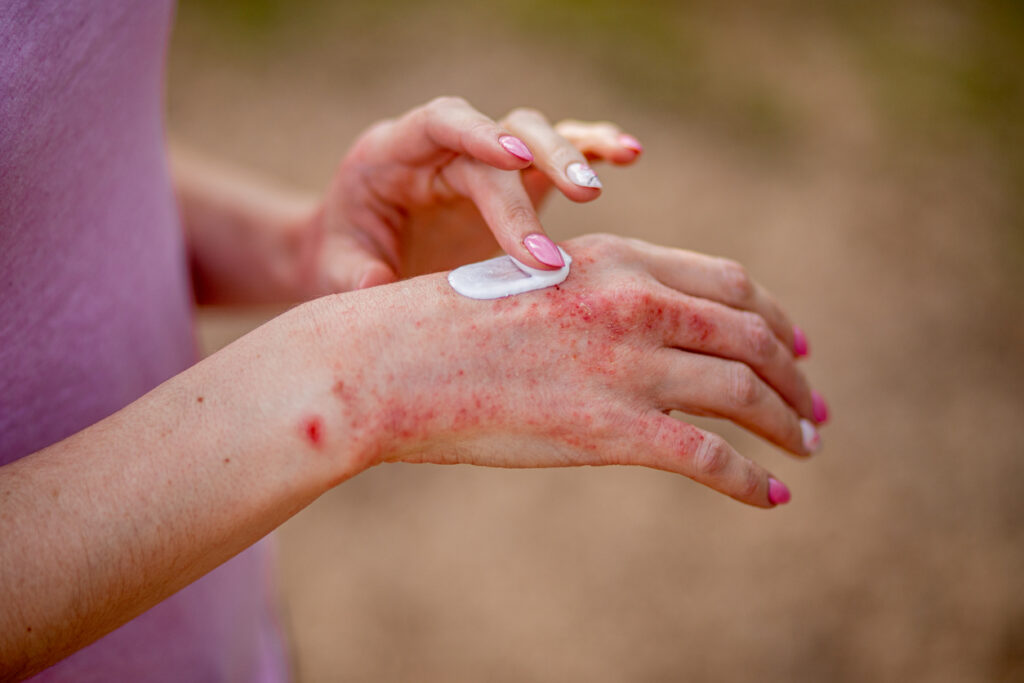Delgocitinib cream (Anzupgo, LEO Pharma) bested cream vehicle and was generally well-tolerated in adolescents with moderate-to-severe chronic hand eczema (CHE) for whom topical corticosteroids are inadequate or inappropriate, according to new results from the DELTA TEEN Phase 3 trial.
In related news, pooled data from five trials of delgocitinib cream confirmed a consistent safety profile for the treatment of moderate to severe CHE in adults.
Both studies were presented at the 2025 European Academy of Dermatology and Venereology (EADV) Congress in Paris, France.
About Delgocitinib Cream
Delgocitinib cream is a topical pan-Janus kinase (JAK) inhibitor for the treatment of moderate-to-severe CHE in adults. It is approved in the European Union, United Kingdom, Switzerland, Canada, Australia, South Korea, and the United Arab Emirates for the treatment of moderate-to-severe CHE in adults for whom topical corticosteroids are inadequate or inappropriate. Delgocitinib cream is also U.S. Food and Drug Administration approved for moderate-to-severe CHE in adults who have had an inadequate response to, or for whom, topical corticosteroids are not advisable.
Delgocitinib is not approved for use in patients aged 12-17 years, and the efficacy and safety in this population has not been evaluated by any health authority.
Delgocitinib Cream Performs Well in Teens and Tweens
The 16-week DELTA TEEN phase 3 clinical trial (N=98) assessed the efficacy and safety of delgocitinib cream in adolescents, aged 12-17, with moderate-to-severe CHE for whom topical corticosteroids are inadequate or inappropriate. The study met the primary endpoint as assessed by the Investigator’s Global Assessment for CHE Treatment Success (IGA CHE TS) at Week 16, defined as an IGA-CHE score of 0/1 (clear/almost clear) with a ≥2 step improvement from baseline.
Delgocitinib cream was shown to be superior in comparison to cream vehicle, with 63.5% of patients responding in the delgocitinib cream arm vs. 29.2% in the cream vehicle arm.
The delgocitinib cream treatment also showed superiority to the cream vehicle across key secondary outcome measures. This included a ≥90% improvement in the Hand Eczema Severity Index (HECSI-90) score from baseline to Week 16 (71.6%) compared to cream vehicle (37.5%) and a ≥4-point reduction in Hand Eczema Symptom Diary (HESD) itch (64.8% vs. 36.8%), pain (63.3% vs. 33.3%), and total (55.6% vs. 31.3%) scores from baseline to Week 16.
No Serious AEs Reported
No serious adverse events (AEs) were reported, and all AEs reported with delgocitinib cream were mild or moderate in severity. The overall proportion of patients reporting AEs was slightly higher for delgocitinib cream than for the cream vehicle. Few AEs assessed as probably or possibly related to the trial drug and AEs leading to withdrawal from the trial or permanent discontinuation were reported, with numerically lower rates for delgocitinib cream than cream vehicle, the study showed.
“The findings from the Phase 3 DELTA TEEN trial may offer hope for young people whose CHE can impact their well-being and leisure activities,” says Professor Sonja Molin, Academic Dermatologist at Charité Universitätsmedizin Berlin in Berlin, Germany, and Adjunct Associate Professor of Dermatology at Queen’s University and coordinating investigator, in a news release. “These results are encouraging and bring us one step closer to advancing the standard of care for this underserved patient group, helping to fulfill their unmet dermatological needs.”
Delgocitinib Cream Safety Profile Outshines Oral Alitretinoin
A pooled analysis of five phase 2b and phase 3 trials analyzed the safety profile of delgocitinib cream compared to cream vehicle and oral alitretinoin. The findings demonstrated that during the initial treatment period (ITP), the event rates (R) of AEs with delgocitinib cream were similar to cream vehicle and notably lower than oral alitretinoin.
The safety profile of delgocitinib cream during the as-needed treatment period remained consistent with the ITP, with AE rates decreasing in frequency over time. The pooled safety data support the wider safety profile of delgocitinib cream for up to 52 weeks of treatment in adults with CHE, the researchers report.
“The results from the pooled safety analysis are incredibly valuable as they further strengthen our understanding of this treatment option,” adds Robert Bissonnette, MD, Lead Author and a Dermatologist at Innovaderm Research in Montreal, Quebec, Canada. “It is reassuring to see that the safety data pooled from five clinical trials remains consistent with previously established findings.”
“We remain deeply committed to further raising awareness of CHE and expanding our extensive scientific research, not only to advance medical dermatology, but, most importantly, to support those living with this debilitating condition,” adds Professor Jacob Pontoppidan Thyssen, Chief Scientific Officer & Executive Vice President of Science, Search & Innovation at LEO Pharma. “Nearly half of CHE patients feel they are a burden to their families, and around 63% avoid holding hands with their partners, highlighting the profound everyday impact this disease can have on patients’ lives. These figures are more than just statistics; they reflect the real and often unseen challenges faced by those living with CHE.”


